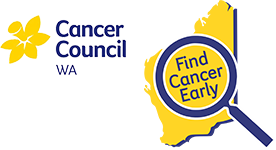Cancer campaign prompts action
Significantly, 26 per cent of South West adults took action within four weeks of seeing the campaign, with a further 53 percent taking action in 12 weeks.
This article was written by Nicole Salmeri and published by the South Western Times, Bunbury on 5 September 2019.
A public health campaign launched by Cancer Council WA to increase community cancer symptom awareness in regional WA is showing positive results within the South West.
The Cancer Council revealed that as a result of the Find Cancer Early campaign, 30 per cent of South West residents took action after seeing the campaign.
South West Regional Education Officer Shenae Norris said two years since the Find Cancer Early campaign received a $1.6 million funding boost from the Government to expand,results showed more people were acting.
“The 2019 evaluation of the campaign is showing that 30 per cent of South West adults took some sort of action after seeing the campaign,” Ms Norris said. “From there, 63 per cent reported monitoring their symptoms and a further 50 percent made an appointment to discuss their symptoms with a local GP.
“Significantly, 26 per cent of South West adults took action within four weeks of seeing the campaign, with a further 53 percent taking action in 12 weeks.” Ms Norris said she was pleased with the results, although a big portion of people surveyed knew only one or two symptoms of the five most common cancers.
“In WA the most common cancers are prostate, breast, skin, bowel and lung, which comprise almost 60 per cent of all cancer diagnoses,” Ms Norris said. “It is important to remember bowel cancer screening kits and mammograms are designed for people who aren’t experiencing symptoms.
“The organisation warns waiting to participate in a cancer screening program could delay your diagnosis and risk a worse outcome.”
Ms Norris said the Cancer Council would be focusing on making people more aware of the common cancer symptoms. “The key factor we are finding is that there is room for improvement in raising awareness of symptoms of the common cancers,” Ms Norris said.
“Most people know maybe one or two symptoms but moving forward we are wanting to encourage people to know three or more to ensure we are covering five common cancers.
“The earlier cancer is found, the greater the chance of successful treatment.”
